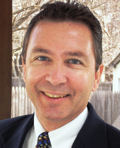 By Scott Kriner, Green Metal Consulting
By Scott Kriner, Green Metal Consulting
This column has covered numerous topics over the years but never have I written a column on a baby. So this is something different. The baby is no ordinary baby. It is my first grandson. He was born into this world on St. Patrick’s Day. He is now representing the “Future Generation”.
Our world measures itself in types of ages. The age of Aquarius, the Space age, the age of social media, the age of information, and even the age of sex and drugs. I can only dream of the age in which my baby boy will flourish as he grows. I think of what his life will be like.
Experts tell us that children born today will likely never drive a car thanks to the expected autonomous automobile technology. Will he see a man or woman on Mars? Will he live in a smart house? Will he lead the charge for net zero waste, energy, and water? How will our planet change over his expected lifespan? Will space travel become as common as today’s airplane travel? Will there be changes to sports, music, finances? Will the field of medicine be different? Will life look more like The Jetsons?
Closer to home, the future generation will likely see changes to how we build and changes to what materials and systems we use to build.
According to Wikipedia, “Future generation or Future generations refers to the generation or generations to come in the future, after the currently living generations of humans. The future generation is contrasted with past generations or generations past. The term started to be used in reference to the impact the currently living generations have on the world future generations will live in; the world they'll inherit from humans living today. Current generations have a moral obligation to provide for sustainable living conditions not just to the future of their own children (Think of the children) but indirectly also to the future of their children's children. This is referred to in the most widely quoted definition of sustainability as a part of the concept of sustainable development. From the Brundtland Commission of the United Nations on March 20, 1987: “sustainable development is development that meets the needs of the present without compromising the ability of future generations to meet their own needs.”
Future generations are not just being talked about in the classrooms of the colleges and universities we've all heard of. Future Generations University (future.edu) takes the whole discussion a step further. According to their vision statement, the initial Future Generations organization was established in 1992, building from a research charge from UNICEF to understand how to scale-up community-based social change. The global family of Future Generations organizations that has subsequently grown “seeks a global shift in practice that promotes partnerships between communities, governments, and organizations to achieve community change and conservation. This action that builds from successes in every community, guided by evidence, has a focus on changing behaviors as the outcome so as to achieve just and lasting futures for these communities. Thus, the global family promotes a vision of "100 nodes of change" or demonstrations that are evolving more effective practices that fit local ecology, culture, and economy. Their objective is to grow a better world for present generations and generations yet to come.”
The University’s core values states: “This university promotes respect for all life and the conditions for harmonious coexistence. It recognizes the dignity of every human being with particular interest in the well-being of families, children, and community. This program adopts a holistic and ecological approach to community change. It emphasizes equity, empowerment, and self-confidence, especially among marginalized members of the community. Future Generations University commits itself to ethical standards of community change, sustainable livelihoods, conservation, and peace-building. The university is also committed to freedom of expression and the pursuit of truth in teaching and learning.”
When I stare into the eyes of my grandson I think of the potential that he has. I know he will do great things. If we think about this we should realize that we all have potential to improve ourselves, our family relationships, our work environment and the industry in which we work every day.